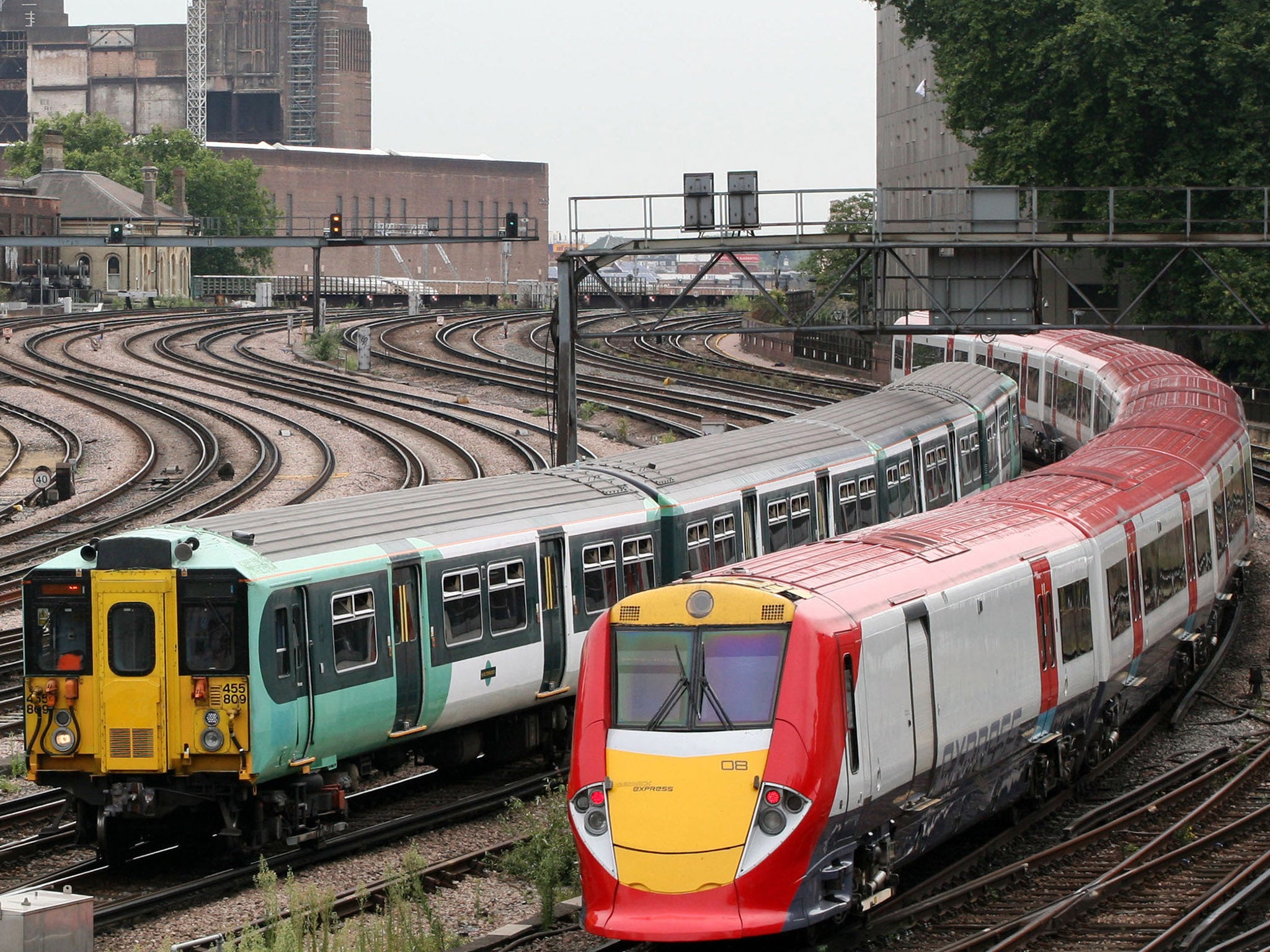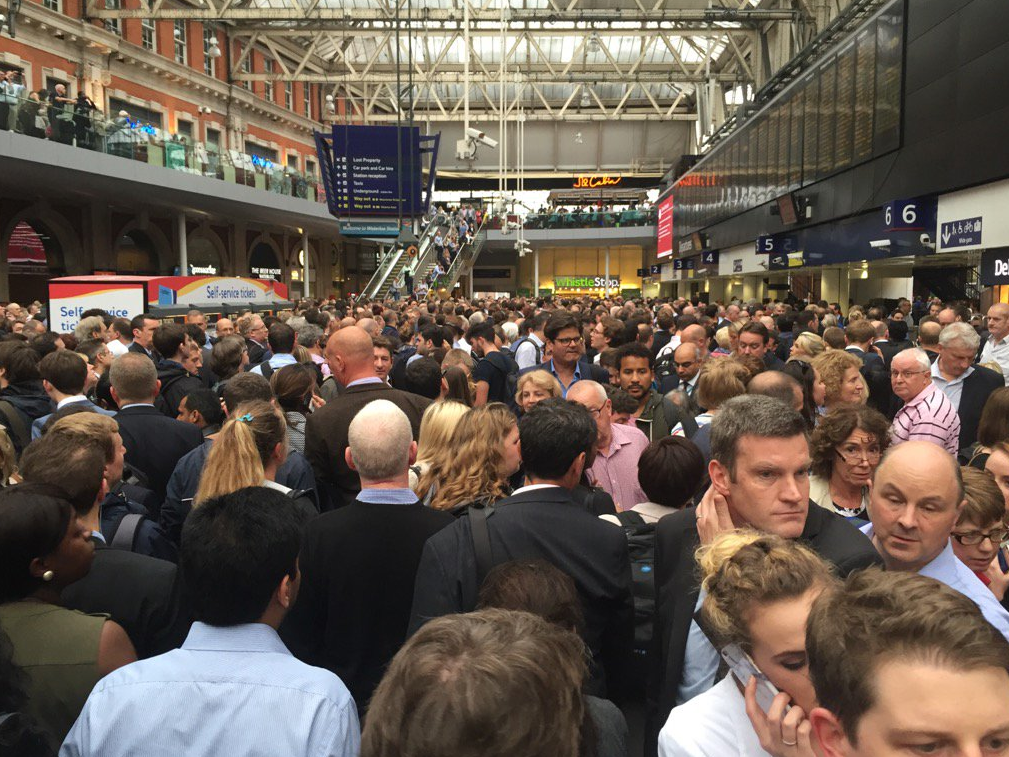UK rail passengers 'endangered' by biggest spending cuts since 2008 financial crash
Exclusive: Unions have warned of another rail 'disaster' after document leaked to The Independent exposes cuts

Your support helps us to tell the story
From reproductive rights to climate change to Big Tech, The Independent is on the ground when the story is developing. Whether it's investigating the financials of Elon Musk's pro-Trump PAC or producing our latest documentary, 'The A Word', which shines a light on the American women fighting for reproductive rights, we know how important it is to parse out the facts from the messaging.
At such a critical moment in US history, we need reporters on the ground. Your donation allows us to keep sending journalists to speak to both sides of the story.
The Independent is trusted by Americans across the entire political spectrum. And unlike many other quality news outlets, we choose not to lock Americans out of our reporting and analysis with paywalls. We believe quality journalism should be available to everyone, paid for by those who can afford it.
Your support makes all the difference.Britain’s railways are about to be hit by the biggest spending cutbacks since the 2008 financial crash amid warnings that it could “endanger passengers lives”, The Independent can reveal.
An explosive leaked document exposes how a national lack of funding has forced rail bosses to cancel a vast array of track upgrades in a bid to save millions of pounds.
The scale of axed projects has led to serious concerns over track safety and also threatens devastating consequences for the rail industry with contractors “hardest hit”.
Unions reacted with outrage, warning of a rail “disaster”, up to 1,000 job losses and claiming ministers are trying to bury the news amid the furore around Brexit. Labour accused the Government of more “broken promises”.
But it is only the latest blow in a broader darkening picture for Britain’s public services – with the NHS effectively ditching operation waiting time targets, defence chiefs considering downsizing the Royal Marines and schools facing the deepest cuts since the 1980s.
The Independent was passed a letter penned by senior Network Rail official Ben Brooks in which he soberly sets out the “testing times” up to 2019, the remainder of the organisation’s “control period 5”.
Mr Brooks wrote: “Because of significant overspends in some areas, including some enhancement schemes and the fact that the routes are more expensive to run than predicted, there is simply not enough money left in CP5 to continue as we have been.
“So the whole of Network Rail has to cut costs.”
He adds: “The last time the track renewals industry had a cost challenge of this magnitude, 7-8 years ago, the supply chain suffered massively (we lost a principal contractor and many second tier suppliers)…this is going to be a tough couple of years for the whole industry.”
His letter then sets out the impact of tightening public finances on Network Rail’s existing “high output” track renewal programme, including the cancellation of:
- All remaining renewal schemes on the London North Western route, running from the Euston Station through Cumbria to Scotland.
- All work on the Wessex route, taking in the major commuter area of South West London, plus routes from Waterloo to the South and South West of England.
- All work planned for 2019 in Wales.
There are reduced renewal programmes on the South East route, covering the network from London across Kent, Surrey and Sussex, and on the Western route from London Paddington to Bristol and Penzance.
The letter reveals that officials planning work on the London North Eastern & East Midlands route, covering lines from the Scottish border to London King's Cross and from Sheffield to London St Pancras, have already deferred £139m of spending.
It meant the end of all programmes on the routes to renew vital ballast, the thick gravel that covers track helping to constrain it under heavy traffic and drain water.
The letter insists that schemes cancelled would be the ones that “don't bring an immediate safety or performance benefit”.
But General Secretary of the TSSA union Manuel Cortes, representing white-collar rail staff, said: “There is simply no need to play austerity politics with rail safety – it will endanger passengers lives.
“If the cuts go through, it is hard to conceive how another rail disaster cannot happen.”
Shadow transport secretary Andy McDonald said: “This is further evidence of the Government’s mishandling of Network Rail. The bottom line is that promised maintenance, investment and upgrades have been poorly planned and managed, meaning that the performance and safety of our railways is undermined.
“It’s not just passengers who will pay the price for these broken promises, but scores of businesses in the supply chain and those employed in the industry are faced with uncertainty. The Government must urgently clarify how they will get the programme back on track.”

The letter from Mr Brooks expressly states that there are currently no plans for voluntary or compulsory redundancies.
But it accepts there could be a heavy cost for those employed by firms carrying out work for Network Rail, adding: “Our sub-contract team members and our supply chain will be hit hardest, as this is the area of the business where we have potential to reduce our workforce quickly and relatively easily.”
A spokesperson for organisation told The Independent: “Network Rail has no plans to cut any safety-critical jobs or any safety critical work. Any such suggestion is ridiculous scaremongering. Network Rail is investing billions of pounds to improve our railway and will continue this investment through to 2019.
“But the rail network has faced a number of cost pressures and changing priorities, and like all businesses we have to live within our means. This sometimes means making hard choices
“We are making savings in non-essential areas to ensure we’re delivering value to the taxpayer, while at the same time continuing to deliver a safe, reliable and expanding railway. The safe running of the rail network will never be compromised and the adjustment in the activity of our high output track renewals work represents just 0.3% of our spend in the running of the railway network.
“Britain has the safest railway in Europe, thanks to the efforts of many thousands of hard working men and women, and they are ill-served by such baseless scaremongering by trade unions.”
A spokesman from the Department for Transport said the Government is delivering the “biggest rail modernisation programme” for more than a century.
He added: “Network Rail has been set stretching targets by the independent regulator, the Office of Rail and Road, to deliver work at a lower cost while maintaining a safe and reliable network.
“This is essential to ensure that maximum value is derived for passengers, freight users and taxpayers.”
Join our commenting forum
Join thought-provoking conversations, follow other Independent readers and see their replies
Comments